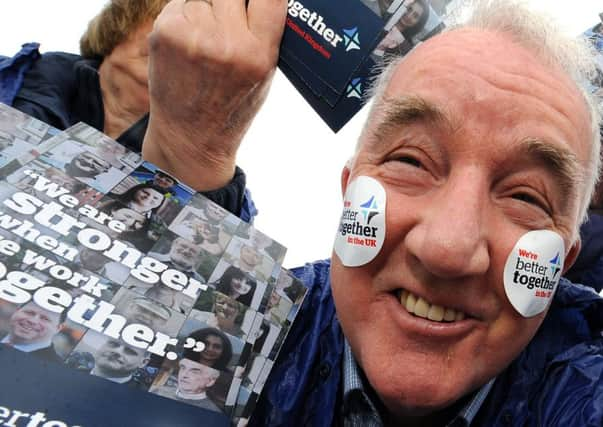Scottish independence: Yes vote at 8-month low


An ICM survey of 1,003 adults puts Yes support at 34 per cent, a fall of five percentage points since the pollster’s last opinion poll a month ago.
The decline in those intending to vote for independence has been accompanied by a rise in those backing a No vote. ICM found that 46 per cent of its sample intended to vote for remaining within the United Kingdom, a rise of four percentage points on April’s poll.
Advertisement
Hide AdAdvertisement
Hide AdOver the same period, the proportion of people who did not know which way to vote increased by one percentage point from 19 per cent to 20 per cent.
The percentage of Yes votes is the lowest level recorded in the series of ICM polls commissioned by Scotland on Sunday this year, and the lowest since September when independence support stood at 32 per cent.
Today’s figures also mark a sharp reverse from last month, when the poll result suggested Alex Salmond was on the brink of securing a famous victory. Four weeks ago Yes support stood at 39 per cent, while No support had declined from 46 per cent to 42 per cent.
When “don’t knows” were excluded from the equation last month, support for independence stood at 48 per cent compared with 52 per cent in favour of a No.
When “don’t knows” are excluded from today’s figures, Yes support is down six percentage points to 42 per cent while No support has rallied to 58 per cent.
The surge in No support comes at a time when the Better Together strategists have been attempting to move up a gear in their campaign, which has faced criticism for being too negative.
Since April’s poll, Labour has rolled out more heavyweight politicians to argue for the United Kingdom.
The former prime minister Gordon Brown made a speech warning of the risks that independence poses for pensions; former Labour cabinet minister John Reid entered the constitutional debate; shadow foreign secretary Douglas Alexander spoke on the Better Together platform at an event invoking the memory of the late Labour leader John Smith; and Labour’s UK leader Ed Miliband visited Scotland.
Advertisement
Hide AdAdvertisement
Hide AdThe poll was conducted between 12 and 15 May, just as Scotland was preparing for a visit from the Prime Minister David Cameron.
A fall in support for independence from female voters was a key finding of the poll, which recorded that only 27 per cent of women intended to vote Yes, compared with 35 per cent last month.
During a period that saw encouraging employment statistics and other signs of recovery, there was evidence that people were becoming more pessimistic about the effect of independence on the economy.
Only 32 per cent of the sample felt that independence would be “good” for the economy, compared with 37 last month. No fewer than 46 per cent thought independence would be “bad” for the economy, compared with 41 per cent last month.
Writing in today’s Scotland on Sunday, John Curtice, Professor of Politics at Strathclyde University, ponders whether people’s views of the economic impact of independence has contributed to the fall in Yes support.
“Maybe the gradually improving picture for the UK economy has made some voters think again,” he writes.
The rising No support was welcomed by Better Together campaign director Blair McDougall, who said: “This is the lowest level of support recorded by ICM for Alex Salmond’s separation campaign since September and makes clear that his bid to break up the UK is failing.
“As the referendum gets closer, more Scots are starting to think seriously about the big issues – like what would replace the pound, how our pensions would be paid and what would happen to the funding for our schools and hospitals. It’s no surprise that as people look at these issues in detail they are overwhelmingly rejecting separation.
Advertisement
Hide AdAdvertisement
Hide Ad“There is a long way to go in this campaign and we need everybody who supports Scotland staying in the UK to do their bit.
“We will be doing everything we can to get across our positive message that as Scots we can have the best of both worlds – a strong Scottish Parliament, with the guarantee of more powers for Scotland, backed up by the strength, security and stability of being part of the larger UK. Only separation puts that at risk.”
Blair Jenkins, chief executive of Yes Scotland, said: “Across all polls that have been conducted this year, average support for Yes support has been rising steadily and there are bound to be peaks and troughs in polls as we move towards the only vote that really counts on 18 September.
“Scotland is one of the wealthiest countries in the world, richer per head than the UK, Japan, France and the majority of developed countries.
“This referendum is about who should be taking decisions about Scotland – the people who live here or politicians at Westminster.
“Independence means we can design a tailored economic policy that always puts job creation in Scotland first.
“With continued hard work I am confident that positive, optimistic message will win out over the negative No campaign.”
Meanwhile, Gerard Butler, the Hollywood movie star from Paisley, has revealed that his desire for independence has cooled, saying he does not believe it would be in Scotland’s interests.
Advertisement
Hide AdAdvertisement
Hide AdIn an interview, Butler said: “I must admit I am not totally sure about independence. I have yet to be convinced that it will work in our best interests.
“I used to be totally pro-independence, I was massively in favour of it, but now my feeling is that we should be about coming together rather than separating ourselves.”